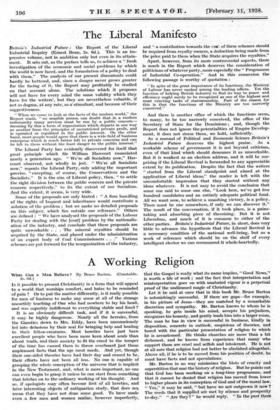The Liberal Manifesto
Britain's Industrial Future : the Report of the Liberal Industrial Inquiry (Ernest Benn, 2s. Od.). This is an im- pressive volume, not in ambition only but even in its attain- ment. It sets out, as the preface tells us, to achieve a " fresh investigation of the economic and social problems by which the world is now faced, and the formulation of a policy to deal with them." The analysis of our present discontents could hardly be bettered, and, since a danger never grows greater for the facing of it, the Report may profitably be studied hardly be bettered, and, since a danger never grows greater for the facing of it, the Report may profitably be studied on that account alone. The solutions which it proposes will not have for every mind the same validity which they have for the writers', but they are nevertheless valuable, if not as dogma, at any rate, as a stimulant, and because of their suggestiveness.
" When we come to look at the facts of the modern world," the Report reads, " no sensible person can doubt that in a modern ecinimunity many services must be run by a public concern— meaning by this a form of organisation which departs in one way or another from the principles of unrestricted private profit, and is operated or regulated in the public interest. On the other hand, most people would agree that there is a wide field of business enterprise which is much better left to private concerns and can be left to them without the least danger to the public interest."
The Liberal Party has evidently discovered for itself that great principle which Sir William Harcourt enunciated nearly a generation ago. " We're all Socialists now," Har- court observed, not wholly in jest. " We're all Socialists now," repeats the Liberal Party, only adding the important proviso, "excepting, of course, the Conservatives and the Socialists." It is the aim of Liberal policy, then, " to settle the right division between the public concern and the private concern respectively," to fix the extent of our Socialism. And the extent, it seems, is very wide.
• Some of the proposals are only hinted : " A firm handling of the rights of bequest and inheritance would contribute a solution of the problem ; but we make no detailed proposals on this subject, which lies outside our reference." Others are defined : " We have analysed the proposals of the Labour
Party for dealing with the [coal] problem by the nationalis- ation of the industry, and conclude that these proposals are quite unworkable . . . The mineral royalties should be acquired by the State, and placed under the administration of an expert body of Coal Commissioners . . ." Various schemes are put forward for the reorganization of the industry,
and " a contribution towards the cost of these schemes should be required from royalty owners, a deduction being made from the price paid to them when the State acquires the royalties."
Apart, however, from its more controversial aspects, there is much in the Report which deserves the consideration of politicians of whatever party, more especially the " Programme of Industrial Co-operation." And in this connexion the following passage is worthy of quotation :
" In spite of the great importance of its functions, the Ministry of Labour has never ranked among the leading offices. Yet the function of helping British industry to find its way to peace and efficiency ought surely to be recognised as one of the highest and most exacting tasks of statesmanship. Part of the reason for this is that the functions of the Ministry are too narrowly conceived."
. And there is another office of which the functions seem, to many, to be too narrowly conceived, the office of the Secretary of State for the Dominions ; and, though the Report does not ignore the potentialities of Empire Develop- ment, it does not stress them, we hold, sufficiently.
As a manual of Political and Economic Science Britain's Industrial Future deserves the highest praise. As a workable scheme of government it is not beyond criticism, even of that kind which should denounce it as unworkable. But it is weakest as an election address, and it will be sur- prising if the Liberal Revival is forwarded to any appreciable extent by its publication. Despite the fact that the writers " started from the Liberal standpoint and aimed at the application of Liberal ideas," the reader is left with the uncomfortable impression that they started without any ideas whatever. It is not easy to avoid the conclusion that some one said to some one else, "Look here, we've got five hundred candidates and an entirely adequate political fund. All we want now, to achieve a smashing victory, is a policy.
There must be one somewhere, if only we can discover it." The result of the conversation, if it took place, is a pains- taking and absorbing piece of theorizing. But it is not Liberalism, and much of it is common to either of the other parties. Britain's Industrial Future, in short, does very little to advance the hypothesis that the Liberal Revival is a necessary condition of the national well-being, but as a work of reference which should be on the shelf of every intelligent elector we can recommend it whole-heartedly.






































 Previous page
Previous page